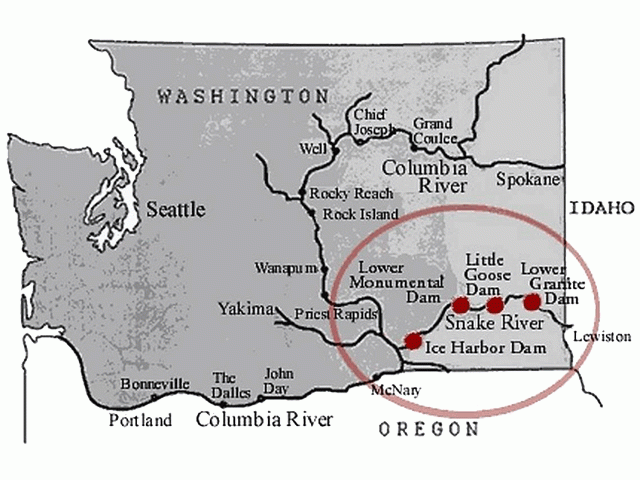DTN Ag Policy Blog
Wheat Growers, NGFA: Breaching Snake River Dams Not Viable
The National Association of Wheat Growers and National Grain and Feed Association on Friday reiterated that breaching four dams on the lower Snake River "is not a viable option," following the release of a report released by Washington state officials on the dams and saving declining salmon populations on the river.
Washington Gov. Jay Inslee and U.S. Sen. Patty Murray, both Democrats, had released a report Thursday that the electric power and navigation benefits provided by the four dams would have to be replaced or mitigated before the dams could be breached. The report largely focused more on replacing the clean energy provided by the four hydroelectric dams, but suggests more transportation analysis is needed "focusing primarily on potential highway and road impact that would result from the elimination of barging on the lower Snake River."
The report from Inslee and Murray stated the "status quo is not a responsible option" and changes in the river are needed to reverse the trends of lower salmon and steelhead runs on the river. "Salmon runs in the lower Snake River are uniquely impacted by the dam structures relative to other watersheds," the report stated. The dams also harmed the Tribal communities that rely on the salmon runs as well.
The four dams -- Lower Granite, Little Goose, Lower Monumental and Ice Harbor -- are at the center of a decades-old fight over salmon and steelhead fish recovery and migration in the Columbia and Snake River basin.
P[L1] D[0x0] M[300x250] OOP[F] ADUNIT[] T[]
The National Association of Wheat Growers (NAWG) has paid close attention the debate over the four dams and threat to barge traffic. The Snake River dams support about 60% of all wheat exports out of the Pacific Northwest, ranging between 80 million bushels to 100 mb annually. NAWG has cited that a single four-barge tow carrying wheat moves the equivalent of 538 semi-trucks.
Responding to the Washington state report, Chandler Goule, CEO of NAWG emphasized the dams are vital to wheat growers getting their product to market.
"We are glad the recommendations released by Sen. Murray and Gov. Inslee recognize the role these dams play in agriculture and acknowledge dam breaching is not feasible at present. However, we remain concerned and opposed to breaching as it would be detrimental to wheat growers across the region," Goule said.
Goule added NAWG had filed comments last month that "other modes of transportation cannot simply replace barging."
The National Grain and Feed Association maintains that any action to breach the dams is not a viable option. NGFA noted the investment decisions grain elevators have made over the years based on the ability to ship grain down the river.
"Barge transportation moves about half of all grain exports to export elevators and is critical to NGFA members in the Pacific Northwest. The Columbia-Snake River System is the third-largest grain export corridor in the world, transporting nearly 30 percent of U.S. grain and oilseed exports," NGFA President and CEO Mike Seyfert said. "Breaching the lower Snake River dams in the Pacific Northwest would create severe economic harm to the entire U.S. agricultural value chain."
Chris Clayton can be reached at Chris.Clayton@dtn.com
Follow him on Twitter @ChrisClaytonDTN
(c) Copyright 2022 DTN, LLC. All rights reserved.




